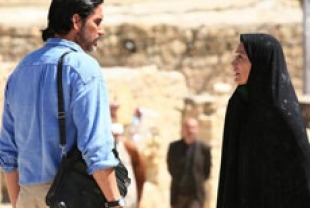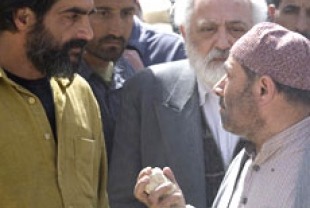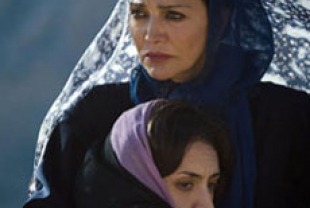The horrific treatment of women by Christian, Muslim, and Jewish fundamentalists is a sad and protracted story. During the Inquisition, many intelligent women healers and free-thinkers were executed by the Catholic Church, and to this day, the Vatican denies women the priesthood. In early U.S. history, women accused of being witches were burned at the stake. The same brutal chauvinism is common in tribal cultures that condone killing of women who bring dishonor to their families and clans. It continues among fundamentalist Muslims who insist that women cover their hair, faces, and bodies, and who subject little girls to genital mutilation. And orthodox Jewish men still begin the day by praying "Thanks be to God for not making me a woman."
It can be argued whether these atrocities are the result of patriarchal societies, tribal traditions, religious beliefs, or a combination of all three influences. To compassionate and justice-seeking people everywhere, the root cause is not as important as that we are aware of what is happening and try to protect women. Violence against women is widespread and worldwide to this day.
The Stoning of Soraya M., co-written and directed by Cyrus Nowrasteh, is inspired by Paris-based journalist Freidoune Sahebjam's acclaimed 1994 international bestseller of a true incident that happened in Iran in 1986. The film opens as the French-Iranian journalist (Jim Caviezel) is traveling through a barren mountainous region of Iran. When his car breaks down, it is hauled to a small village where Hashem (Parviz Sayyad) says he will try to fix the broken radiator. After Zahra (Shohreh Aghdashloo), a local woman, tries to speak to the reporter, the mayor of the village (David Diaan) and the local mullah (religious leader) (Ali Pourtash) push her away and offer to buy him lunch, but he says he has work to do and goes to the café to eat alone. There he receives a note from Zahra with a map to her house. He meets her there and learns that she has a story she wants him to tape and tell to the world. The story is then told in flashback.
Soraya (Mozhan Marno) is a competent and loyal wife who has given her tyrannical and physically abusive husband Ali (Navid Nagahban) two sons and two daughters. He works as a guard at the prison in the nearby city and has set his sights on the 14-year-old daughter of one of the prisoners. He wants to marry her and move to the city with his two sons. But Soraya refuses to give him a divorce. She fears that she will not be able to support her two daughters in the village. The only one she can turn to for help and counsel is her aunt Zahra, an outspoken widow who has a keen sense of justice and a fearlessness that makes her stand out in the male-run community.
When the mechanic Hashem's wife dies, the village elders suggest that Soraya cook for him, clean his house, and look after his mentally retarded son for a small fee. She sees this as a route to freedom from Ali. Her husband seizes upon the arrangement as a way to get rid of her. He conspires with the mullah, a con man released from the prison where Ali works, to accuse Soraya of infidelity — specifically having an affair with Hashem. The passive mayor allows the conspirators to present weak evidence before an all-male court.
Zhara does all she can to save her niece, but the cards are stacked against them. After a heart-breaking farewell to her daughters, Soraya is led out to the center of the town, buried up to her waist in sand, and stoned. It is long and painful death for this innocent woman. This is a very difficult scene to watch as Soraya's father throws the first stones, followed by the vengeful Ali, and then Ali forces his sons to stone their own mother before the crowd finishes her off.
Some of the scenes in the film are excessively melodramatic, and the depictions of Ali and the mullah as the pure manifestations of evil are a bit overdone. The narrative is focused on the key characters, and we get only a little sense of how others in this village are reacting to the events. But there is a primal thrust to this poignant drama that overshadows these defects and probably explains why The Story of Soraya M. was the runner-up to Slumdog Millionaire for the Audience Choice award at the 2008 Toronto Film Festival.
This compelling film draws attention to the global dimensions of hatred, persecution, and executions of women. Some reports estimate that least 1,000 women have been stoned to death over the past 15 years in Iran, Nigeria, Somalia, Sudan, Iraq, United Arab Emirates, Afghanistan, and Pakistan. In addition, the United Nations estimates that some 5,000 women each year, including some in the United States, become victims of so-called "honor killings" in which family members kill a woman who has allegedly brought dishonor on them through such acts as dressing provocatively or engaging in illicit sex. In the movie, tribal tradition sets the stage for the anger against Soraya and male bloodlust takes over as the villagers turn into a murderous mob.
From the press notes, it's clear that the film's producers want to increase awareness of violence against women and encourage activism against it (see the organizations listed at right). Presumably, they do not want to inflame anti-Muslim sentiments in the West. Unfortunately, throughout the film, the mullah insists that in condemning Soraya, they are only following Islamic law and during the stoning scenes, the villagers chant the verses of Islamic prayers from the Qur'an. No effort is made to clarify that the con-man mullah, while citing Sharia Law favored by Islamic fundamentalists, is not accurately stating what the Qur'an says about adultery.
Here's what Islam's most holy book says: Even if Soraya had had an affair (and she was innocent), the punishment suggested in the Qur'an is 100 lashes for both the offending man and woman. The adultery must be proven with four reliable eye witnesses of the act. One should be careful not to falsely accuse a faithful woman.
The Stoning of Soraya M. is a stark and painful example of what happens when evil is justified by a distortion of what is good, in this case, Islam. This, too, must be confronted. Millions of Muslims suffer every day as they see how their religion is misused by a misinformed faction and thus is misunderstood by other peoples around the world. Soraya's story is even more painful and disturbing to them, and our hearts go out to them in empathy.
Special features on the DVD include an audio commentary with director and co-writer Cyrus Nowrasteh and co-writer Betsy Giffen Nowrasteh; an audio commentary with the film crew; and an exclusive behind-the-scenes featurette: "The Making of The Stoning of Soraya M."


